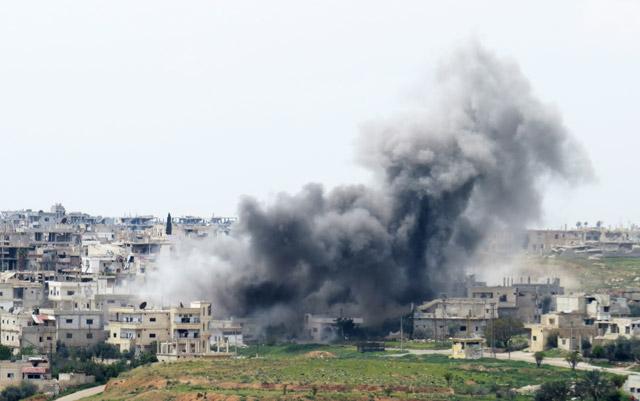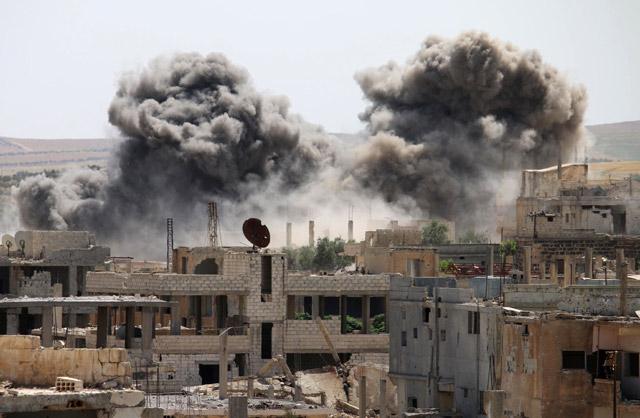You are here
Syria's Assad says chemical attack '100 per cent fabrication'
By AFP - Apr 13,2017 - Last updated at Apr 13,2017

Smoke rises after the warplanes belonging to the Syrian Regime Forces bombed the Menshiyye neighbourhood as Syrian military opposition advance towards the centre of Daraa, Syria, on Monday (Anadolu Agency photo)
DAMASCUS — Syrian President Bashar Assad said a suspected chemical weapons attack was a "fabrication" to justify a US military strike, as Moscow digs in to defend its ally despite increasing strains with Washington.
In an exclusive interview with AFP in Damascus — his first since the alleged April 4 attack prompted a US air strike on Syrian forces — Assad said his army had given up all its chemical weapons and that Syrian military power was not affected by the US strike.
"Definitely, 100 per cent for us, it's fabrication," he said in the interview on Wednesday in reference to the alleged chemical weapons attack.
"Our impression is that the West, mainly the United States, is hand-in-glove with the terrorists. They fabricated the whole story in order to have a pretext for the attack."
Western leaders including US President Donald Trump have accused Assad of being behind last week's attack in the rebel-held town Khan Sheikhun, saying his forces unleashed a chemical weapon during an air strike.
The suspected attack killed at least 87 people, including many children, and images of the dead and of suffering victims provoked global outrage.
Syria denied any use of chemical weapons and Moscow said the deaths had been the result of a conventional strike hitting a rebel arms depot containing "toxic substances".
'Fake videos'
In the interview, Assad insisted it was "not clear" whether an attack on Khan Sheikhun had even happened.
"You have a lot of fake videos now," he said. "We don't know whether those dead children were killed in Khan Sheikhun. Were they dead at all?"
He insisted several times that his forces had turned over all chemical weapons stockpiles in 2013, under a deal brokered by Russia to avoid threatened US military action.
"There was no order to make any attack, we don't have any chemical weapons, we gave up our arsenal a few years ago," Assad said.
He said his forces had not been diminished by the US strike.
"Our firepower, our ability to attack the terrorists hasn't been affected by this strike."
Denouncing a "very barbaric" attack, Trump ordered a strike that saw 59 Tomahawk cruise missiles slam into the airbase in central Syria from where Washington accused Assad's forces of launching the attack.
Trump bats aside criticism
It was the first direct US military action against Assad's forces since the start of Syria's civil war six years ago and led to a quick downward spiral in ties between Washington and Moscow.
Russia accused the United States of breaking international law with the strike against the Syrian regime, a key ally that Moscow has supported with air strikes since 2015.
Trump gave such criticism short shrift on Wednesday, saying: "I felt we had to do something about it. I have absolutely no doubt we did the right thing."
On Thursday Trump expressed confidence that US-Russia ties would improve.
"Things will work out fine between the USA and Russia," Trump said in a tweet. "At the right time everyone will come to their senses & there will be lasting peace!"
The strains in ties were clear as US Secretary of State Rex Tillerson received a frosty reception on Wednesday on a visit to Moscow, where he said there was now "a low level of trust" between the two countries.
Russia vetoes resolution
The polarised positions were evident too at the UN Security Council on Wednesday, when Russia vetoed a Western-drafted resolution that would have required Syrian cooperation in an investigation into the suspected chemical attack.
It was the eighth time that Russia has used its veto power to block action directed at Damascus.
In a show of continued support for the regime, Moscow was to host Syrian Foreign Minister Walid Muallem for talks with Foreign Minister Sergei Lavrov on Thursday.
On Friday the two will join a three-way meeting with Foreign Minister Mohammad Javad Zarif of Iran, another key ally of the Assad regime.
Since breaking out with mass protests in March 2011, Syria's conflict has spiralled into a devastating civil war that has left more than 320,000 people dead and forced millions from their homes.
The war has drawn in a wide of range of global powers, from Russia and Iran in support of the regime, to Western nations, Turkey and Arab Gulf states in support of various rebel forces.
The war also led to the emergence of the Daesh terror group, which seized control of large parts of Syria and Iraq in 2014 but has since lost much of the territory it once controlled.
Daesh is facing twin offensives by Iraqi forces on the city of Mosul and by an Arab-Kurdish alliance on its de facto Syrian capital Raqqa, backed by a US-led coalition that launched air strikes against the extremists in 2014.
The coalition said Thursday that one its air strikes had accidentally killed 18 members of the Syrian alliance south of Tabqa, a strategically important town on the Euphrates River close to Raqqa.
"The strike was requested by the partnered forces, who had identified the target location as an ISIS fighting position," a coalition statement read, using an alternative acronym for Daesh.
"The target location was actually a forward Syrian Democratic Forces fighting position," it said, offering its "deepest condolences".
Related Articles
PARIS — France will produce proof "in a few days" that the regime of President Bashar Assad launched a chemical strike on a Syrian village t
WASHINGTON — The Pentagon believes the Syrian regime likely has additional chemical weapon stocks at the airfield struck by US missiles last
MOSCOW — Syria's military is ready to halt fire around the rebel-held town hit by a suspected chemical attack if experts are sent in to cond
















